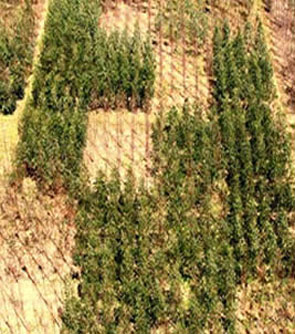WASHINGTON, Oct. 7 – A coalition of environmental groups lost a Florida court case against USDA’s Animal and Plant Health Inspection Service (APHIS) regarding field trials of genetically engineered eucalyptus trees.
ArborGen, developer of the eucalyptus trees, and the Biotechnology Industry Organization (BIO) helped USDA’s APHIS in its defense against allegations that USDA did not adequately prepare an environmental review before allowing the company's field trials to move forward. The environmental groups alleged that APHIS did not comply with federal law in issuing certain permits to ArborGen.
On July 1, 2010, the Center for Biological Diversity, the Center for Food Safety, the Dogwood Alliance, the Global Justice Ecology Project, the International Center for Technology Assessment and the Sierra Club brought the case against APHIS and USDA.
The U.S. District Court for the Southern District of Florida denied the plaintiffs’ motion for summary judgment yesterday and granted the summary judgment motions for the government, ArborGen and BIO.
“The biotechnology sector has been plagued by a series of lawsuits aimed at eliminating or inhibiting the use of biotechnology in agricultural products,” said BIO president and CEO, Jim Greenwood, in a statement after the ruling. “These types of negative actions only serve to hinder investment and create barriers to economic growth for innovation in the United States.”
The plaintiffs claimed that APHIS violated the National Environmental Policy Act (NEPA) when it issued the eucalyptus permits.
“NEPA is a procedural statute that requires the federal government to make fully informed decisions with respect to actions implicating environmental consequences,” according to the statement by U.S. District Judge K. Michael Moore. “However, NEPA does not mandate particular results, but simply prescribes the necessary process.''
The permits in question authorized ArborGen to plant the GE eucalyptus on 28 sites in seven states. Before granting the permits, APHIS prepared an Environmental Assessment (EA) and opened it to public comment. APHIS issued a finding of no significant impact (FONSI) and determined that an environmental impact statement was not necessary.
The eucalyptus field trials are testing ArborGen’s freeze tolerant eucalyptus. The company’s first-generation freeze tolerant tropical Eucalyptus is targeted at southeastern states. The trees are designed after the Brazilian Eucalyptus, but grow in areas significantly farther north than conventional tropical eucalyptus.
The environmental groups oppose these trials because they fear the GE eucalyptus could become an invasive species, harming other native wildlife and plants.
“Releasing GE cold-tolerant Eucalyptus trees into the wild in multiple states greatly increases the risk they will spread uncontrollably throughout the region,” said Sierra Club chemist, Neil Carman, in a press announcement.

#30
For more news, go to http://www.agri-pulse.com/
